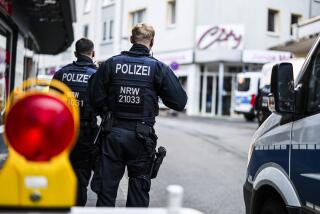Stampede at music fest kills 18
- Share via
BERLIN — A music festival rooted in the heady and optimistic days that followed the fall of the Berlin Wall ended in tragedy Saturday when at least 18 people attending the hugely popular Love Parade were crushed to death as crowds panicked inside a tunnel and started a stampede.
The police said that more than 200 people were injured at the rave, which had attracted an astonishing 1.4 million people and is reputed to be the largest techno music festival in the world.
The stampede is believed to have occurred when revelers dashed to enter the tunnel after being told by police that the festival grounds in the western city of Duisburg had been closed off because of crowding.
Kevin Krausgartner, a 21-year-old who found himself trapped in the tunnel, told German news media he had witnessed “gruesome scenes.”
“I’ve never seen anything like it,” he said. “There were 25 people lying in a heap. I screamed; people could no longer get any air. I saw dead people, and one person was sitting there looking extremely pale. I wanted to give him some water, but the ambulance medic told me there was no point as he was already dead.”
Krausgartner said he saw police “standing on the bridge doing nothing.”
Incongruously, the sound of thumping bass notes boomed across the festival grounds as many revelers, unaware of the tragedy nearby, continued to party.
Police apparently encouraged organizers to keep the event going as a way of trying to prevent an even bigger outbreak of panic, fearing that people would storm the exits.
“The crisis team set up in Duisburg has decided for security reasons not to end the event,” city spokesman Frank Kopatschek said.
The tragedy unfolded at 5 p.m. But according to reports from police, revelers and reporters, there were already plenty of signs much earlier in the day that the event was dangerously overcrowded. By midday, police were warning crowds to stay away, saying too many revelers were trying to pack into the space.
The Love Parade, which began in Berlin 21 years ago, was being held in Duisburg for the first time in an old train depot on the edge of the city, which was cordoned off by a metal fence.
Before the festival, some officials had wondered whether it was too big for the 500,000-strong city to manage. But Duisburg was proud to be hosting such a major cultural event, which is also a huge moneymaker.
Emergency rescue teams suggested that the tragedy may have been exacerbated by the fact that they had difficulty reaching the site. Revelers had spilled onto a neighboring highway, blocking the route designated for emergency vehicles. Once the medics arrived on the scene, they had to struggle through the tightly knit masses.
Ten years ago, a similar concert crush left nine people dead at a Pearl Jam concert in Denmark.
The Love Parade has always prided itself on its nonaggressive image, and was for years held as a political demonstration whose message was world harmony and peace.
It was organized by Berlin’s underground music scene and quickly attained cult status, attracting electronic music fans from around the globe who dance to music pumped from high-wattage speakers on floats.
At its height in the 1990s, it attracted as many as 1.6 million ravers. It has over the years spawned many copy-cat events in places as far afield as Acapulco and Tel Aviv. It was moved from Berlin to the Ruhr Valley in 2006 after disputes between the organizers and authorities in the capital over who was responsible for the considerable cleanup and security costs, which ran into the millions of dollars.
Connolly is a special correspondent.
More to Read
Sign up for Essential California
The most important California stories and recommendations in your inbox every morning.
You may occasionally receive promotional content from the Los Angeles Times.










